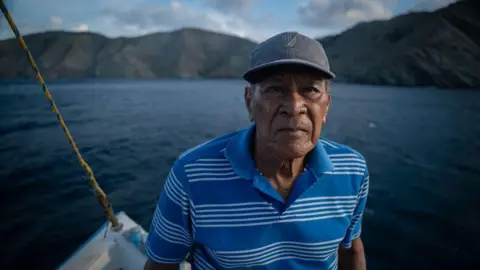Lizbeth Perez looks fearful as she gazes out onto the postcard-perfect fishing bay of Taganga, on Colombia's Caribbean coast, recalling the moment she last spoke to her uncle in September.
He was a kind man, a good person, a friend. A good father, uncle son. He was a cheerful person. He loved his work and his fishing, Lizbeth remembers.
Alejandro Carranza said goodbye to his family early on the morning of 14 September, before going out on his boat as usual. The next day, US officials announced a strike on a vessel believed to be connected to violent drug-trafficking activities originating from Venezuela.
Ms. Perez has not seen her uncle since. His five children miss their father, and the family waits anxiously for answers about his involvement in the attack, which left them unsure if he was the one killed.
The truth is we don't know it was him, we don't have any proof that it was him, apart from what we saw on the news, she adds.
The US began targeting alleged drug-trafficking vessels following an uptick in military operations in the Caribbean, claiming several lives in the process. Defence Secretary Pete Hegseth emphasized the campaign's purpose is to eradicate drugs threatening US security.
President Gustavo Petro of Colombia has condemned these strikes, suggesting that they violate international law and put Colombian lives at risk. In a twist, Petro claimed that Carranza might have been among those killed in the attack, a statement that provoked a stern rebuke from the US government.
Petro’s allegations seem to be a part of a larger narrative criticizing the Trump administration’s approach to drug enforcement, which has recently involved a significant military presence in the region.
The family hopes for a speedy resolution to their situation and desires a broader dialogue regarding the effects of US foreign policy on local communities, especially with ongoing tensions surrounding Colombian and Venezuelan relations amidst the strikes.
Many locals like Juan Assis Tejeda, an 81-year-old fisherman, express fears about the ramifications of these military actions on their livelihoods, noting the dangers of being mistakenly identified as participating in drug trafficking.



















